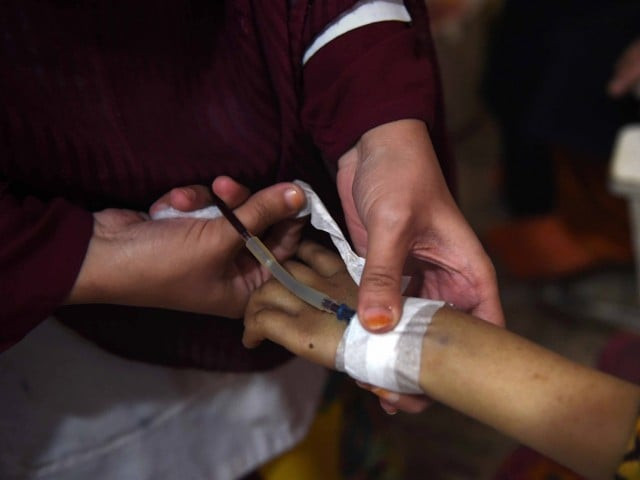Thalassemia thrives in absence of premarital testing
Despite the passage of 12 years, the law to prevent the genetic blood disorder could not be implemented

A stitch in time saves nine. The true meaning of this saying would be best understood by the hapless parents of children with thalassemia, who in their expediency to avoid one premarital test doomed their children to a life revolving around endless needles, blood bags and medicines.
One such parent was Aslam Mujahid, who was unaware that both he and his wife were thalassemia carriers since the couple, like most brides and grooms across the country, were unaware of the need for a premarital test. "My son has thalassemia, and he requires monthly blood transfusions. This is a very difficult process for the parents. Sadly, we couldn't avoid this since we had no clue about the need for a premarital test," regretted Mujahid.
Mujahid's regret is shared by thousands of parents across Sindh, who failed to detect the genetic disease before getting married thanks to the failure of the government to implement the Sindh Prevention and Control of Thalassemia Act 2013. Under this law, it was mandatory for couples to undergo thalassemia testing before marriage, while genetic counselling and diagnostic facilities for the disease were also to be introduced. Furthermore, pregnant women were to be tested for thalassemia and a registry of test results to be devised in order to compile the statistics of the disease in the province. However, despite the passage of 12 years, the law remains unimplemented.
According to Dr Saqib Ansari, a haematologist, 240,000 bottles of blood are required annually to save the lives of more than 25,000 children suffering from thalassemia across the province. "Each child requires two transfusions per month. In addition to blood, children with thalassemia also need medicines and laboratory tests, which together can cost up to Rs400,000. We have no bone marrow transplant facility in Pakistan. Yet, every year, 5,000 more babies are born with this congenital disease across the country," revealed Dr Ansari
Although there is no reliable data on thalassemia in Pakistan, a study conducted in 2022 revealed that about 9.8 million people in Pakistan are suffering from thalassemia, which constitutes 11 per cent of the total population. Experts blame consanguineous marriages for the high incidence of thalassemia in Pakistan.
According to research published by the Population and Development Review, 57.6 per cent of ever-married women in Pakistan are related to their husbands either as first cousins or second cousins. While the practice of cousin marriage, which involves much deeper social and cultural factors, cannot be curtailed as easily, enforcing one simple thalassemia test before marriage can give many couples the life-altering opportunity of choosing whether or not to go ahead with a relationship where one or both the partners are carriers of the genetic disease.
However, due to a lack of awareness on the disease and implementation of the law, no steps have been taken in this regard so far, due to which thalassemia continues to plague thousands of children and their families.
Syed Mehdi Rizvi, Head of an NGO working on thalassemia, believed that both the public and the government were to blame for the endemic nature of thalassemia in the province. "A law on thalassemia exists in the province, under which families are obliged to carry out the premarital test of both the bride and the groom. The report must then be attached with the marriage certificate. Unfortunately, however, the government and the public have failed to implement this due to which the incidence of the disease could not be controlled," said Rizvi. In this regard, the spokesman of the Health Minister was contacted, however, the correspondent was told that Dr Azra Pechuho is on leave.






















COMMENTS
Comments are moderated and generally will be posted if they are on-topic and not abusive.
For more information, please see our Comments FAQ